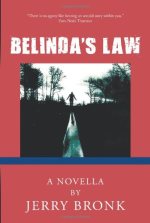Author: Jerry Bronk
Title: Belinda’s Law
Publisher: Trafford
ISBN: 978-1466996274
Pages: 168, Paperback/Kindle
Genre: Fiction
Author Interview with Jerry Bronk
Author Interview With Jerry Bronk
Title: Belinda’s Law
Interviewed by: Russell D. James, MA, MLIS, Pacific Book Review
Today we are talking with Jerry Bronk, author of “Belinda’s Law.”
PBR: How many of the…characters are based on real life persons and how so?
All characters are composites and there is little creativity involved. This lack may account for some characters (eg, Cathy, Judy) not being developed as fully as they could be.
PBR: If you could write a sequel, which characters or spin-off from this book, which character or characters would you use as the starting point?
Since I have trouble with female characters (!) I don’t think I could get sufficiently into the head of Rita, Cathy or even Bel to be convincing. No, I don’t have any of those folks buzzing in my head and wanting top billing.
PBR: Which writer has most inspired you to write this book?
Certainly no writer inspired me to write this book or even write any fiction. By the time I started this project I was “post biblio.” Ie, I had only enough energy and brain power to keep up with my periodicals (professional rate helped to raise that stack).
I don’t have a favorite (fiction) writer and my reading experience seems to be a process of interest and then losing such. Eg, John Irving, Maeve Binchy, and Philip Roth are among the many that I’ve lost interest in. Or Cormac McCarthy, who borrowed from Yeats for a title (to be outdone by a powerful movie) only to lose me on The Road. Even Jane Austen: I don’t think I could read anymore after Master Piece Theater brought her works to such vivid life. (After suffering a case of aghastness at some critic describing Darcy’s cruelly presumptuous proposal as “the most romantic…in literature,” I explained the Darcy/Miss Bennett relationship only to be rejected.
And then there is Haruki Murakama. After much enthusiasm I decided I wasn’t going to spend a significant part of my life being informed (1Q84, ten lbs of CDs) of a young woman’s softball career.
No, there was no literary inspiration; only a slightly absorbed cumulative and amorphous effect.
PBR: Your book could’ve taken place in the 70s, 80s or 90s, but which did you intend?
Jeff is in the army before Vietnam and he’s already been around a bit. He alludes to his childhood and exit from high school. But It’s the 80s & 90s when the primary story unfolds. The end would come about at the end of the C.
PBR: What character do you feel should resonate most with your readers?
Well, if readers don’t respond to the narrator’s “memoir,” then Jeff should remain as he says, one of the 99% who will never be validated by publication or payment.
PBR: You deal with a lot of psychology in your book. Are you a psychologist of just a lover of psychology?
I’ve sampled the usual writers but it’s mostly pop and/or contemporary commentary that I read. Eg, The Cult of Self Esteem and Bad Romance (both The Atlantic). Jeff says “superficial” about his comment, but I guess since I’ve implied or claimed some authority in letters on various, including psychological, I may have more than superficial insight but certainly not professional grade.
PBR: Why did you make Belinda’s father such a broken character?
That’s an odd way to pose the Q. I must’ve missed the “broken” part.
PBR: What were the real life impetuses for your sitting down and writing a book?
There is an alternate reality called “legal reality.’’ A fiction that reveals the “truth behind the facts,” in this particular “Law” arena, has never been told. I have told and shown a singular tale that challenges and informs a generally accepted “reality.”
To learn more about Belinda’s Law click here


